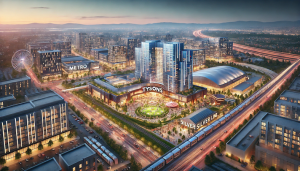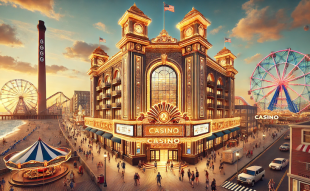The idea of a casino in Virginia continues to spark debate. The Tysons casino project, spearheaded by the developer Comstock, envisions a combination of gambling, entertainment, and hospitality for Fairfax County. While some see this as an opportunity for growth, others remain wary.
Spending for and Against the Casino Proposal
Recently, opponents of the Tysons casino project have spent nearly $1 million campaigning against it. However, supporters have significantly outspent them, investing $2 million to back the proposal. The financial tug-of-war highlights the contentious nature of this initiative.
A fresh legislative effort aims to include Fairfax County on Virginia’s list of jurisdictions eligible to host a casino. This new push represents an evolution of discussions carried over from the previous legislative session.
Senate Bill 982 and Its Key Conditions
Senate Bill 982 (SB 982), introduced by Scott Surovell, the Senate majority leader, is at the heart of the new effort. The bill, filed earlier this week, has been referred to the Committee on General Laws and Technology for consideration. The proposal echoes aspects of earlier discussions while presenting updated conditions for the project’s approval.
Under the bill, the casino must be located within a quarter-mile of a Metro Silver Line station. Additionally, it must be within two miles of a regional enclosed mall with at least 1.5 million square feet of space and outside the Interstate 495 Beltway. The project also requires a mixed-use development featuring no less than 1.5 million square feet.
Potential Economic Advantages of the Casino
Christopher Clemente, CEO of Comstock, recently emphasized the economic benefits of the Tysons casino during an interview with NBC Washington. According to Clemente, Tysons currently generates around $250 million in annual tax revenue, a figure expected to double if the casino project moves forward.
Clemente noted that the casino could also enhance Tysons’ nightlife and broader community offerings without requiring public funding. He explained that:
By bringing a casino operation to a development like that, we can do those other things that are beneficial to the community, the county, and the state.
Scott Surovell also highlighted the financial implications for Virginia. The state currently loses an estimated $300 million annually as residents travel to Maryland’s MGM National Harbor. Surovell expressed his hope to redirect that spending back to Virginia, stating that the funds could support education and other vital services in Fairfax County.
Community and Workforce Impacts
Support for the Tysons casino project extends beyond developers and lawmakers. Local unions back the initiative, citing the potential for job creation. The project promises both temporary construction jobs and permanent employment opportunities, which could invigorate Fairfax County’s economy.
However, not all feedback has been positive. Some experts in defense and intelligence view the casino as a potential national security concern, adding another layer of complexity to the debate.
Approval Process and Future Steps
Before the Tysons casino project can proceed, it faces several significant hurdles. The proposal must first secure approval from Virginia’s legislators and gain the governor’s signature. Following these steps, it will be presented to voters in a referendum. Only after clearing these stages can the project move forward.
Other Proposed Casino Projects: New York City
The proposed Tysons casino in Fairfax County, Virginia, and the various casino projects in New York City present distinct potentials within the gaming industry. The Tysons project envisions a mixed-use development near the Spring Hill Metro station, potentially encompassing up to 8 million square feet. This development aims to capture revenue currently lost to neighboring states, with estimates suggesting that 30% of MGM National Harbor’s revenue comes from Virginia residents. In contrast, New York City’s casino proposals, such as the $12 billion Hudson Yards project by Related Companies and Wynn Resorts, seek to introduce large-scale entertainment complexes into an already bustling urban market. These projects are part of New York State’s plan to issue up to three downstate casino licenses, aiming to generate substantial fiscal benefits for the state’s public schools and local economies.
Community impact is a significant consideration for both projects. In Tysons, local residents and officials have expressed concerns about the potential negative effects on the community, including increased traffic, crime, and the suitability of a casino in the area. Fairfax County Board of Supervisors Chairman Jeff McKay noted that the county did not request state authority for a casino and has raised concerns brought forward by the community. Similarly, in New York City, proposals have faced resistance from community boards and local organizations. For instance, the Hudson Yards casino proposal was unanimously rejected by Manhattan’s Community Board 4, citing concerns about greed, disregard for the community, and potential negative impacts such as loss of planned residential units and environmental issues.
Financial projections for these casino projects highlight their potential economic impact. The Tysons casino is expected to significantly boost local tax revenue, with estimates suggesting that Tysons currently generates approximately $250 million in tax revenue per year, a figure expected to double if the casino project moves forward. In New York, the Hudson Yards project is part of a competitive race for casino licenses, with developers proposing substantial investments. For example, the Hudson Yards proposal is valued at $12 billion, while other contenders, such as the Metropolitan Park project near Citi Field in Queens, propose investments up to $8 billion. These projects aim to generate significant economic benefits, including job creation and increased tourism revenue.
Within the broader gaming industry, these projects reflect a trend toward integrating casinos into mixed-use developments to create comprehensive entertainment destinations. The Tysons proposal includes plans for a luxury hotel, convention center, concert venue, restaurants, shops, and workforce housing, aiming to revitalize the area and attract a diverse clientele. Similarly, New York City’s proposals often feature casinos as part of larger complexes that include hotels, residential buildings, parks, and cultural amenities. This approach aligns with industry trends focusing on creating multifaceted attractions that offer more than just gambling, appealing to a broader audience and enhancing economic viability.
Related News
-
- The Coney’s $200M Community Pledge Hinges on Casino License Approval
- US Influencers Promote Betting on Polymarket Despite Restrictions
- Online Advertising’s Influence on Youth: A Closer Look at Gaming and Gambling
- Contrasting Fortunes: Macau’s Gaming Growth vs. Las Vegas’s Decline
- Best Bitcoin and Crypto Casinos in the USA


